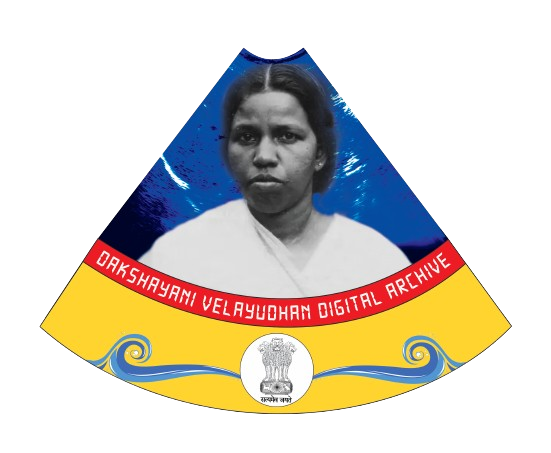Dakshayani Velayudhan Digital Archive
for Constitutionalism and Gender Rights
Judicial intervention has played a crucial role in imparting gender justice in India. Over the years, Indian courts have delivered judgments and made legal interventions to address issues related to gender inequality, discrimination, and violence against women. Here are some notable instances of judicial intervention in promoting gender justice. These judicial interventions reflect a commitment to upholding constitutional values and promoting gender justice. It is important to note that while legal rulings are essential, the effective implementation of laws and changing societal attitudes require a comprehensive approach involving legislative reforms, awareness campaigns, and community engagement. Judicial decisions often act as catalysts for broader social change, influencing policy reforms and fostering a culture of gender equality in India. Here we explore landmark judicial decisions contributed to feminist jurisprudence and gender justice in India
-
Air India v Nergesh Meerza
Air India v Naresh Meerza is a landmark case in the Indian feminist jurisprudence. It marked a vital step towards accomplishing gender equality in the workplace and paved the way for further challenges against discriminatory practices. The case points up the significance of promoting gender-sensitive laws and policies. It also underlines the ongoing struggle for…
-
Anuj Garg & Ors vs Hotel Association of India & Ors
The case of Anuj Garg v Hotel Association of India has emerged as a significant milestone in the trajectory of feminist jurisprudence within the Indian legal landscape. This landmark case, which unfolded in the early 2000s, brought to the forefront critical questions regarding gender equality and access to economic opportunities for women. The case sparked…
-
Aparna Bhat v State of Madhya Pradesh
Aparna Bhat v. State of Madhya Pradesh is a landmark case which unveiled the gender stereotypes prevalent in judicial process and its consequences on the rights of women and marginalized communities. The case involves a public interest litigation (PIL) petition filed by Aparna Bhat, a social activist and lawyer, in the Madhya Pradesh High Court.…
-
Bodhisattwa Gautama V Subhra Chakraborty
In the case of Bodhisattwa Gautam v. Subhra Chakraborty, the Supreme Court of India addressed critical issues concerning the rights of rape victims within the criminal legal system. The Supreme Court’s judgment in this case underlined the importance of protecting the rights and dignity of rape victims, predominantly in cases of custodial violence. The court…
-
Centre For Enquiry into Health and Allied Themes V Union of India
In this landmark case, Supreme Court of India addressed the issue of prenatal sex determination and sex-selective abortions. The case was filed for seeking strict regulation and enforcement of laws to restrict prenatal sex determination, which was being misused for selective abortions, particularly of female foetus. The Supreme Court, in its judgment, recognized the serious…
-
Daniel Latifi &Anr v Union of India
In Daniel Latifi v. Union of India, the Supreme Court of India addressed problems related to the maintenance rights of divorced Muslim women. The petitioner, Daniel Latifi, challenged the constitutional validity of Section 125 of the Code of Criminal Procedure, which provides for maintenance to wives, children, and parents who are unable to maintain themselves.…
-
Indian Young Lawyers Association V State of Kerala
In Young Lawyers Association v. State of Kerala, the Supreme Court of India has examined the constitutional validity of the Sabarimala Temple’s practice of excluding women of menstruating age (10-50 years) from entering the temple. The petition challenged the custom as discriminatory and violative of women’s fundamental rights under the Constitution, particularly Articles 14 (Right…
-
Joseph Shine v Union of India
In Joseph Shine v. Union of India, the Supreme Court of India has scrutinized the constitutional validity of adultery laws in India. In this case, the petitioner challenged the validity of section 497 of the Indian Penal Code, which criminalized adultery, arguing that it violated the fundamental rights to equality and privacy guaranteed under Articles…
-
Kajal Mukesh V State of Maharashtra
In this case, Supreme Court of India has addressed the issue of trafficking for the purpose of prostitution and the interpretation of certain provisions of the Immoral Traffic (Prevention) Act, 1956. The petitioner, Kajal Mukesh Singh, challenged the decision of the Bombay High Court, which had convicted her under various sections of the Immoral Traffic…
-
Lata Singh vs State of U.P. & Another
In the case of Latha Singh v. State of Uttar Pradesh, the Supreme Court of India addressed the matter of protection for individuals involved in inter-caste marriages. The Supreme Court, in its judgment, emphasized the importance of uplifting the right to individual autonomy and personal liberty, including the right to choose life partner. The Court…
